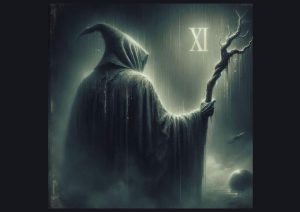
Echoes of the Fjords: Terje Gravdal’s “Wild Child” Unleashes a Primal Truth
From the heart of Norway’s dramatic west coast, in the serene town of Odda, nestled amongst towering fjords and breathtaking vistas, emerges Terje Gravdal, a musical storyteller whose voice resonates with the raw beauty and introspective spirit of his homeland. His latest single, “Wild Child,” is more than just a song; it’s a powerful anthem, a poignant reflection on the human condition, and an urgent call to embrace the untamed essence that lies within us all.
“Wild Child” isn’t simply a catchy melody; it’s a profound exploration of identity, a heartfelt lament for the stifled natural instincts of a generation caught in the whirlwind of modern life. Gravdal’s meticulously crafted soundscape provides the perfect sonic canvas for this introspective journey. His warm, inviting acoustic guitar, the gentle caress of keyboard chords, and the sweeping, emotive strings create a sonic tapestry that feels both deeply personal and universally relatable. It’s a sound that mirrors the very landscape that shaped him – vast, untamed, and profoundly moving, echoing the ancient rhythms of the Norwegian wilderness.
But it’s Gravdal’s voice, a rich, gravelly instrument honed by the winds of experience and the quiet contemplation of nature, that truly anchors the track and gives it its undeniable emotional weight. It’s a voice that carries the weight of lived experience, the wisdom gleaned from observing the world with a keen and compassionate eye. He sings not merely to entertain, but to provoke thought, to ignite a spark of recognition within the listener’s soul, urging them to question the very foundations of their existence.
At the core of “Wild Child” lies a compelling and deeply resonant narrative: the plight of those individuals born with an inherent, primal urge, a relentless drive to explore the boundaries of their existence, to test the limits of their potential, and to learn through direct, unfiltered experience. Gravdal paints a vivid and empathetic portrait of these “wild children,” individuals whose innate curiosity, boundless energy, and unwavering spirit often clash with the rigid, often stifling structures of modern education and societal expectations. They are the warriors, the hunters, the innovators, the trailblazers, driven by a genetic imperative to engage with the world on their own terms, to forge their own paths through the wilderness of life.
Gravdal’s lyrics, far from being mere rhyming couplets designed for easy consumption, are a carefully constructed argument, a passionate and articulate defense of these often-misunderstood individuals. He speaks of a “high sensation,” a “love for action,” and a fundamental “need” to explore the unknown. These aren’t simply superficial character traits; they are fundamental aspects of human nature, deeply encoded within our very “DNA,” the blueprint of our being. He boldly posits that true strength lies not in conforming to the often-arbitrary norms of society, but in embracing one’s unique “natural kind,” in fearlessly riding one’s “own wave,” in charting a course guided by the compass of one’s own heart.
The song delves into the inherent tension between our innate wildness, that primal connection to the natural world that has shaped our species for millennia, and the increasingly artificial and often alienating structures of modern life. Gravdal poignantly questions whether our children, the future of our world, are truly thriving in a system increasingly dominated by digital technology, standardized testing, and rigid, inflexible teaching methodologies. He suggests, with a profound sense of concern, that the accelerated “pace of experience” in our technologically saturated world may be overwhelming their senses, hindering the development of essential motor, social, and mental skills that are crucial for navigating the complexities of life.
He challenges the prevailing notion that these “wild children,” these vibrant souls brimming with untamed energy, are somehow the problem, suggesting instead that the very system designed to nurture them may be fundamentally flawed. The lyrics subtly hint at the potential consequences of suppressing this innate drive, of forcing these wild spirits into the confines of a pre-determined mold – a potential for both great destruction and profound heroism, depending on how this primal energy is channeled and directed. The “warrior,” the “stone-cold killer,” and the “helper in a wartime thriller” are all facets of the same fundamental human energy, simply expressed and directed in different ways, depending on the circumstances and the choices made.
Gravdal’s masterful use of evocative imagery, potent metaphors, and carefully chosen language amplifies the song’s message, giving it a depth and resonance that lingers long after the final notes fade away. He speaks of a “bloodline,” a “signature,” and an “identity” that is deeply rooted in our genetic heritage, a connection to the past that shapes our present and guides our future. He emphasizes the paramount importance of “travelling,” both literally and metaphorically, of setting the “wild soul free” from the shackles of convention, and of finding one’s own unique “way” through the labyrinth of life. These aren’t just lyrical flourishes designed to impress; they are potent symbols of the arduous but ultimately rewarding journey towards self-discovery, authenticity, and a life lived in harmony with one’s true nature.
The recurring phrase “It’s in my DNA” serves as a powerful and insistent reminder of the deep-seated, almost primordial nature of this wildness. It’s not a conscious choice, a fleeting whim, or a rebellious act; it’s an inherent and immutable part of who we are, woven into the very fabric of our being. The song’s final iteration, “Cause I’m a worrier, still on my way,” adds a crucial layer of vulnerability and self-awareness, acknowledging the inherent challenges, uncertainties, and anxieties that inevitably accompany the courageous act of embracing one’s true self and navigating the often-treacherous waters of life.
“Wild Child” is far more than just a captivating song; it’s a profound cultural commentary, a deeply philosophical exploration of the human condition, and a powerfully personal expression of Gravdal’s own journey of self-discovery and artistic expression. It’s a call to action, a heartfelt plea to recognize, nurture, and celebrate the wild spirit that resides within ourselves and within our children, the future custodians of our planet. In a world that often seems to prioritize conformity, standardization, and the relentless pursuit of material success over individuality, authenticity, and the quiet wisdom of nature, Terje Gravdal’s “Wild Child” stands as a powerful and enduring testament to the enduring power of the untamed soul in a world that desperately needs to reconnect with its wild roots. It’s a track that demands to be heard, felt, and pondered, leaving a lasting impression on the listener’s heart and mind, urging them to embark on their own journey of self-discovery and embrace the wild child within.
OFFICIAL LINKS: FACEBOOK – SPOTIFY – INSTAGRAM – YOUTUBE – TIKTOK


